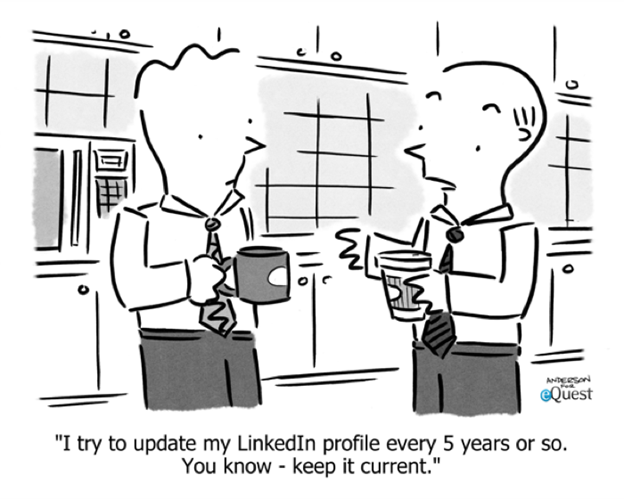On Taking Weak Crap Off Your Resume
Your resume is (probably) like a fine wine, it gets richer with age – thanks to you getting better right along side it. But those early work experiences that are totally irrelevant to your job as a manager or the industry you’re in now have got to go. Let’s figure out how to beat the nostalgia and bygone youth so that you can take the weak crap off your resume.
Ah, those were the days. Remember when you were captain of the Hockey Team in undergrad, or employee of the month at the grocery store for 3 months in a row, or spent a term doing the filing at your uncle’s office? Just beginning your career, anything counted as ‘work experience’ and found its way on to your resume. Heck, you might not have even know what you wanted to be yet! Maybe one day you would indeed be a VP at Starbucks, so that barista experience comes in handy. Chances are, you’ve asked yourself the question ‘what should I put on my resume!?’ at some point in your career.
You should probably update your resume more often than this.
Have you seen How I Met Your Mother? There is an episode where the characters challenge each other to remove unrelated and old experiences from their current resumes. For example, Lily won a hotdog eating contest, and Ted had a university radio show listed on his CV.
Unless Ted (who is an architect) decided to pivot his career into radio media, or Lily (a kindergarten teacher) transitioned into some kind of culinary-related field, these experiences are clearly unrelated to their current career paths and have no place on their resume. These are the “weak crap” resume items to which I am referring.
Yet they were still there.
So, What Should You Include On Your Resume?
According to Indeed.com, a resume is supposed to be a summary of your qualifications to show that you are qualified for a specific position. It can include education, work experience and skills. Anything not in aide of this objective might be “weak crap” that isn’t helping your case.
Do you have some work experiences on your resume that are “weak crap”?
Here’s a little framework to know if something on your resume is “weak crap”.
Ask yourself, is it:
Outdated (from the first 20-25% of your years working)?
Irrelevant (to your current professional interests)?
Impressive to anyone other than you (and maybe your mom)?
You might be holding on to some items on your resume for reasons other than helpful tidbits for a prospective employer to read. This ‘weak crap’ might be a candidate for ‘things to remove from your resume’.
Things to remove from your resume immediately
Status Quo Bias
We like things the way they are. We have a preference for the current state of affairs, and we prefer what is familiar. This can result in us more or less unthinkingly keeping less impactful stuff on our resume when editing it than what we would otherwise do when bringing a fresh eye.
Projection Bias
We have a tendency to over-predict that people’s future preferences will match the way they are now. Ten years ago it could have been trendy to include your Dragon Boat team as work experience, but maybe employer tastes for what gets included in resumes evolved in that time. Past You doesn’t know as much as you about the current job market, so why are you letting Past You call the shots?
Nostalgia and Rosy Retrospection
Ah, remember the good old days? We have a tendency to recall the past more fondly than perhaps it was actually experienced (this could be attributed to the Peak-End Rule). Letting go of these formative work experiences might be difficult because they are tied to a youthful identity of yourself that is perhaps different than the (potentially less fun-loving) version of yourself you see currently in the mirror. Sometimes accepting that you’ve had a shift in identity (and maybe a shift you didn’t really want!) is really hard.
Sometimes its time for a change
But there is a solution… the “Personal Interests” section.
What Are Good Personal Interests for a Resume?
Having personal interests on your resume shows the hiring manager who you are as a person. It can help build rapport with your interviewers, identify something you have in common with the team, showcase an impressive skill, or make for interesting conversation.
It also might help you stand out in the crowd, or even to be more memorable. Hey, remember that guy who juggles? He had great quantitative skills.
What counts as a great interest to put in this section? According to Indeed.com: “Interests are often the activities you do in your spare time that involve dedication and translate directly into a professional setting. For example, volunteering for an organization would be an interest.” i.e., not just a hobby or leisure pastime.
Some good examples of personal interests include:
Notable Athletics (including achievements)
Volunteerism
Intellectual Activities like Blogging
Things to DEFINITELY take off your resume
The Personal Interest test. Ask yourself: if I was the hiring manager, does this interest tell me something about the candidate’s chances of being successful in this role or not?
If it passes the test, move that “weak crap” experience to your interest section. If it fails, take it off.
The Bottom Line
Don’t let biases get in the way of refining your resume!
My Sassy Signoff... available upon request,







